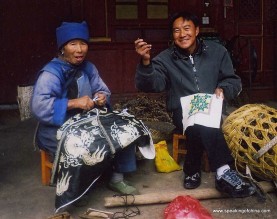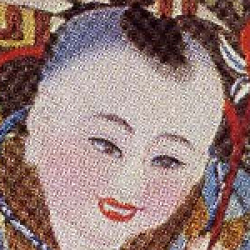What a couple of days. We just landed in Shanghai last evening, and were immediately hit with the infamous humidity of the Yangtze River Delta. It should have been no surprise to me, having lived in Hangzhou for a year and a half, and Shanghai for three years. But if you’ve just arrived from Lijiang, the heat hits you hard, as if you were suddenly wrapped in a jacket you didn’t even know existed. Today, arriving in Suzhou, I discovered the temperature was 42.3 degrees Celsius (over 100 F).
Yet, sadly, the differences between Lijiang and Shanghai (and the coast, for that matter) are becoming less and less as the city commercializes. I spent one week in Baisha, a charming Naxi village with cobblestone streets (watch out for that manure) that captured my heart five years ago when I came across a young Naxi/Yi minority trader named Bi Zhihui. Bi Zhihui touched me so deeply because of his extraordinary traditional embroidery (a dying art in his culture), his faith (he is Catholic, just as I was raised Catholic — he calls me “sister”), and his incredible depth of kindness. He once told me a story of how a Chinese tourist once came into his store and, after trying on one of his vests, then threw it insultingly on the floor. But Bi never argued with the guy or got angry (though he did kindly ask him to leave). I kept in touch with Bi over all of these years, and have even tried to help him in ways I could never have imagined.
Things have changed A LOT in five years, in ways that, admittedly, I wish weren’t so. Lijiang has now become a Disneyland version of the town it once was. Even in 2004 you could still find Naxi and other minority traders with a presence in the old town — restaurants, quaint little shops, small snack stands. Not anymore. The old buildings are still there, but every square foot of the entire place has been taken over by extreme commercialization. There are stores, but they are by and large run by Han Chinese, and sell items that are either made in factories (but made to look like they were done by the locals) or simply have no local flavor (translation: you could buy it in Shanghai or Beijing or Xi’an). It was so easy to get lost in there because, apart from the occasional store with actual local products (such as Spirulina), everything looked so much the same. That was heartbreaking enough, as well as learning that Bi, who used to have a store in the old town, had to give it up long ago because the rent was too high (a fate I expect hit many of the local Naxi people who used to be holed up in the old town).
But it was the Bar district that really gave me a moment to pause. Yes, there were still the same Chinese style buildings with the elegant curved roofs, the carved wooden windows open to the world, the river nearby with a romantic little bridge spanning it, and the small courtyards — but all pumped up to an alarming Shanghai beat as the place swarmed with people and the bars blared so much music you almost forgot you were in remote little Lijiang. As we weaved through the throngs of people, I peered into the bars, open to the world like a book. There were emcees looking and acting cool in cool Shanghai style clothes, announcing the next act as if it were Michael Jackson or Jay Chou taking the stage. There were young women dressed in minority clothing, but the way they sauntered and swayed, and the way the clothing seemed to leave their silouettes as exposed as the Jade Dragon Snow Mountain peaks, I didn’t have to hear Bi tell me they weren’t local Naxi women. Finally, I came to the famous start of the Old Town, where there is an old water wheel and the words, in Chinese, “World Heritage” written by Jiang Zemin himself. But it was worlds away from the Old Town I remembered, as the water wheel itself seemed to be one-upped by a huge four-sided TV screen planted in the square just in time for the 2008 Olympics. We were there at night, and between the light from the screen and blaring TV sound, I felt the romance of the place slipping away with each turn of the water wheel.
There is also now an 80 RMB “restoration fee” for the city of Lijiang, which wasn’t there before. I can’t help but wonder what has been restored (which wasn’t there before), and what, if anything, can be done to bring the old Lijiang back. Even the foreign tourists I met while there told me the only time of day they could really enjoy Lijiang was about 7am in the morning.
Still, at least there is still Baisha. I have faith that Baisha will not lose its charm, as it is still a place where your car can be stopped by a herd of cattle or goats, where you have to watch where you walk (yes, that manure), where the stores are run by local Naxi people, and where the Jade Dragon Snow Mountain seems to smile from above. Maybe I have even more faith, having lived there for a week in his gorgeous siheyuan, and having met the people that Bi calls friends and family. I dined on fantastic taro and wild mushrooms and local celery and, truly, some of the best fragrant, spicy sauce I’ve ever had in China. I watched Bi persevere, in spite of the huge blow that the economic crisis has brought to him (but I worry, nevertheless). I helped him make new business cards, and renovate a new sign for his store, and re-evaluate his sales strategy. And I am still overwhelmed with all of his unbelievable kindness throughout the week, from having us as guests, to coming up to my room when I was sick to check on me. It was like being at home again.
But then again, that is why I come to China in the first place. And it is why I will go back to China (and Baisha) again. Especially when Hangzhou and Suzhou are hot as hell! Good night.

